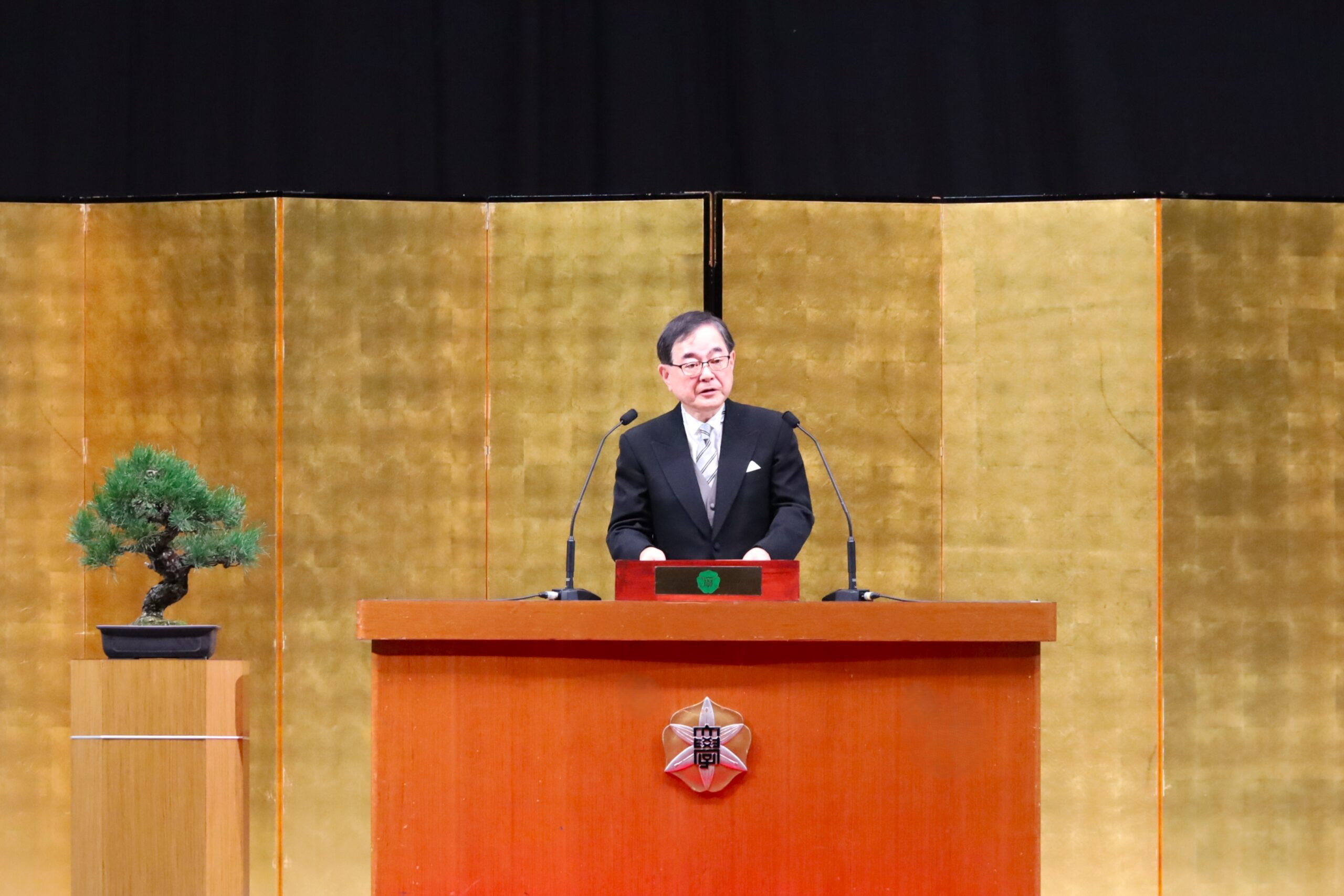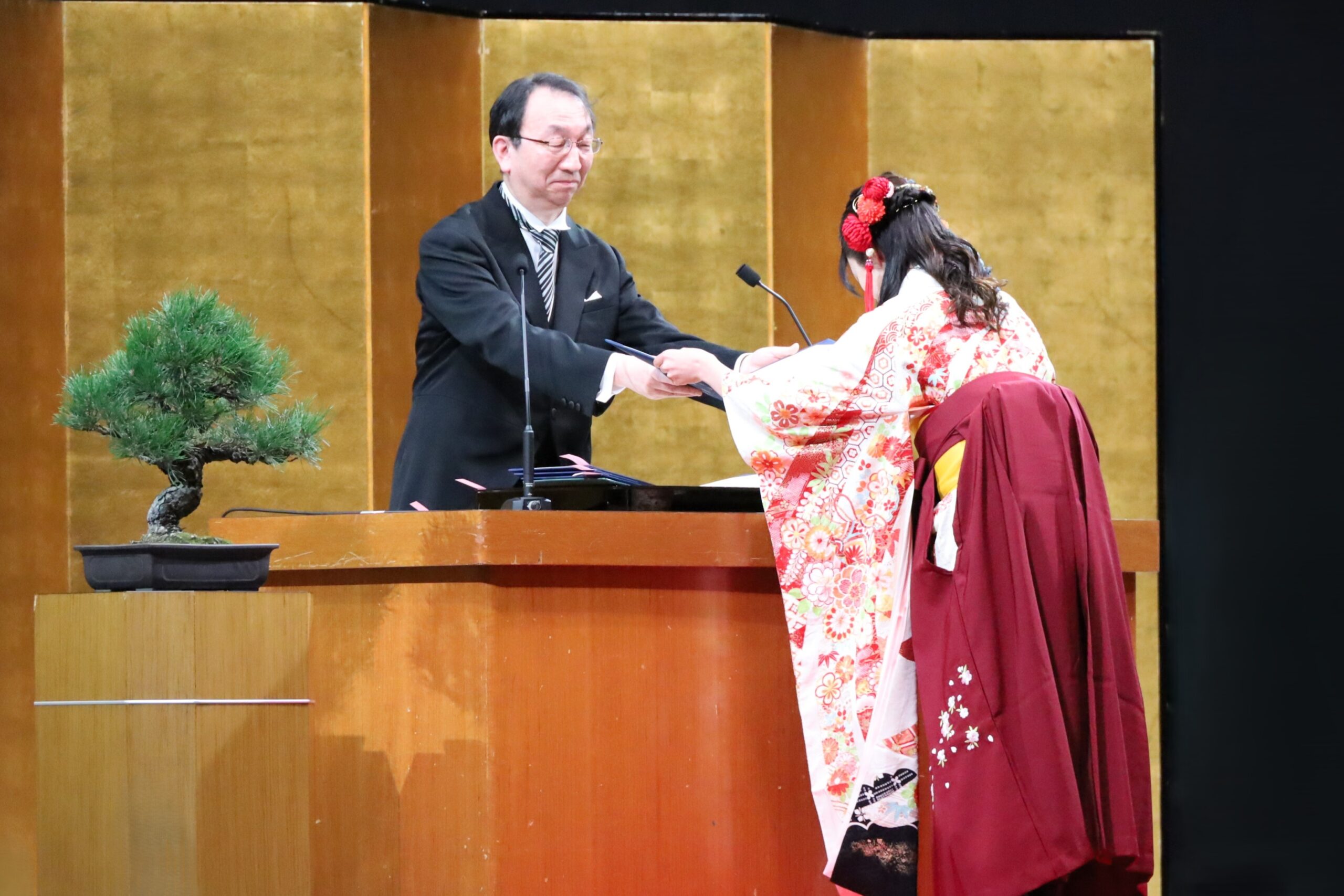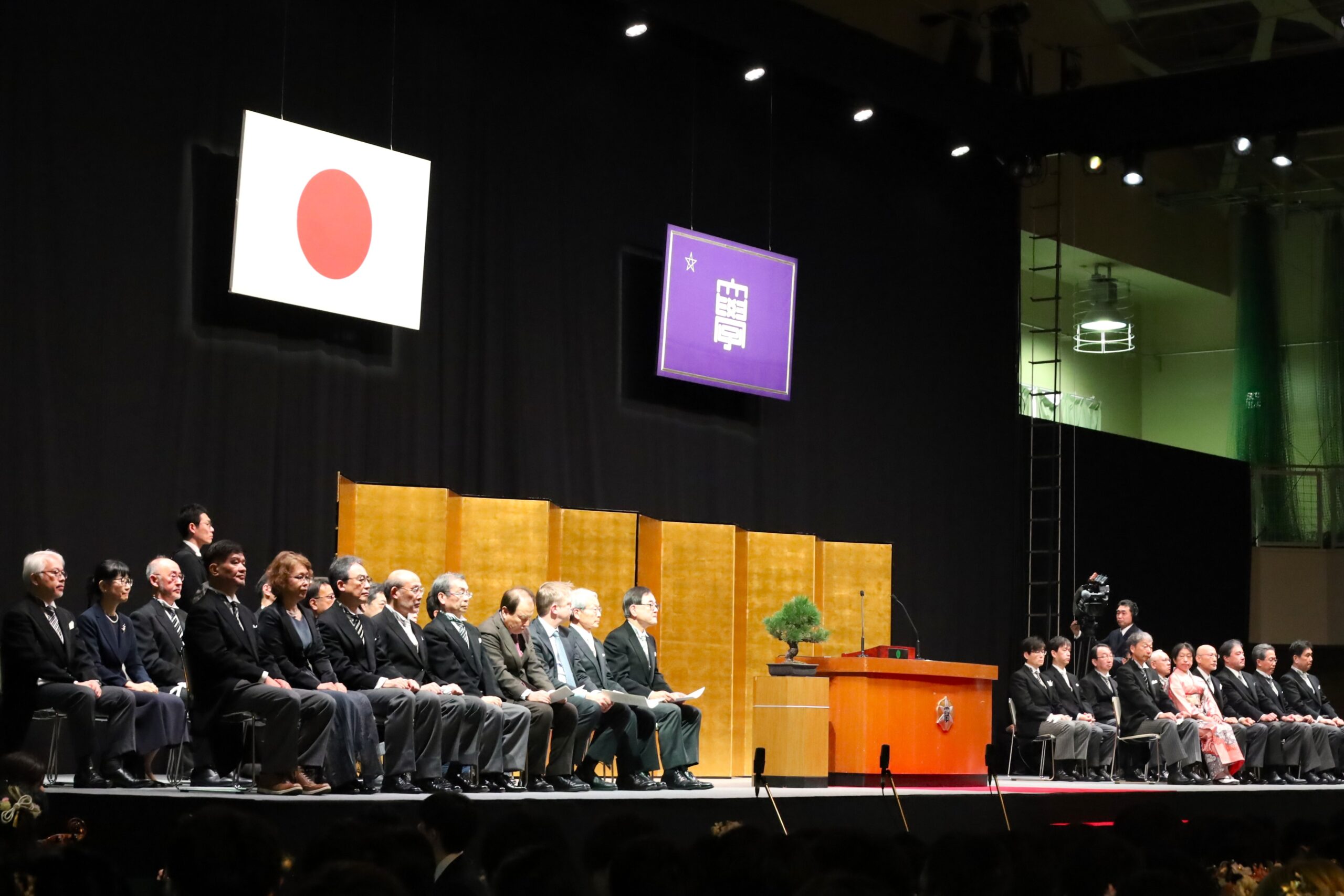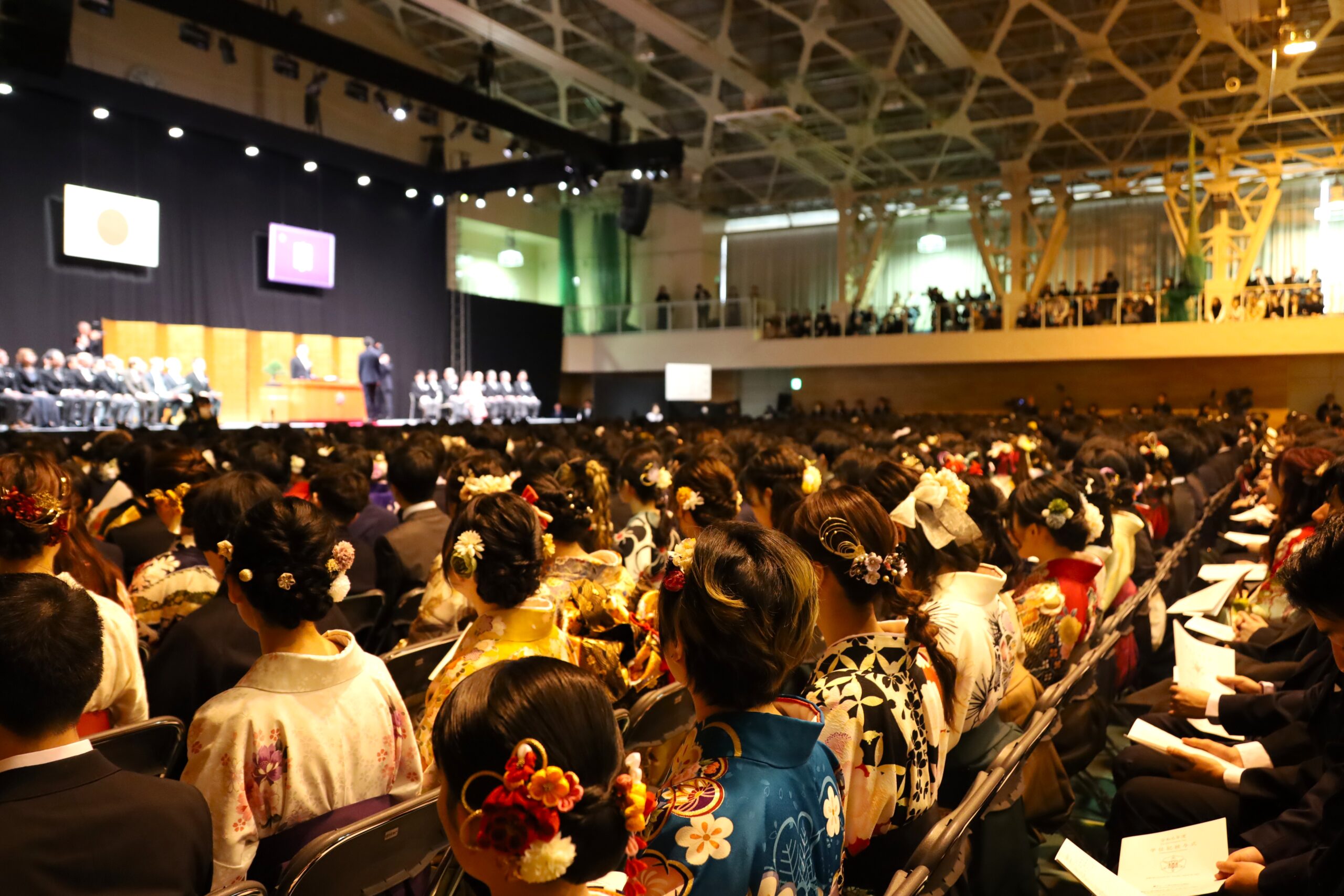Graduate Degree Commencement Ceremony – Farewell Address (March 2025)
University News | March 25, 2025
Congratulations to all 1,960 students who are graduating today. Completing the highest level of education and research in graduate school is no easy feat, so allow me, on behalf of Hokkaido University, to offer my sincerest congratulations on this prestigious accomplishment.
I would also like to extend my heartfelt congratulations to our 342 international students, who have persevered through their studies in a foreign environment with remarkable dedication and commitment. You have my deepest respect for all you have accomplished.
Congratulations also to the families, guardians, mentors, and all others who have supported these graduates along their journey. Additionally, I would like to express my deepest gratitude to everyone who has supported the University during this time.
After today, you will all be venturing out into the world; in other words, we are sending you out into the world. This is what graduation represents.
In the current world you are emerging into, remarkable changes are taking place every day. At a glance, they may appear to be complex and even random. But I can see that all of these changes share one commonality. They are all moving towards obscuring existing democracy, sometimes transforming it, and, in some cases, denying parts of it. These changes are manifesting themselves across the world, in all regions and countries. In Japan, too, we are shaken by these changes through social and traditional media.
In turn, there appears to be a swell of a simple ideology attempting to dominate our world, which is inherently complex and diverse. This formidable force now sweeping the world is cleverly revealing the weaknesses of democracy and globalization, whose strengths have been diversity and complexity, and aiming the world in a different direction by presenting other possibilities that might try to limit democracy or diversity in our world.
As scientists and academics, we cannot simply sit by and be a spectator of these current events. And for you, the youth who have studied the fundamental principles of science and are about to play key roles in the world, this serious issue cannot be avoided. Because this imposing movement does not hesitate to conveniently exploit “science” itself, the foundation of our society, —often through misinformation, manipulation, or deliberate simplification.
Take, for example, diversity. In the current world, there is an increasingly strong push against diversity compared to previous years. I admit that, in the past, even I have struggled to see the fundamental reasons why diversity inherently makes our world a better place. Why is diversity important? Why is it heralded as superior? These are questions I have previously been unable to answer with confidence.
However, recently, through conversations with many different people, I have come to understand something about diversity. In nature and life, it is our essential, strongest “survival strategy.” To put it another way, diversity in an ecosystem is essential for its healthy survival, whether that ecosystem is the Earth, a living organism, a country, or an organization. Diversity is crucial to its survival, and an ecosystem strengthened through diversity results in even greater diversity, further enhancing the system and its resilience. That is to say: survival strategies and diversity are inseparable, in both cause and effect. I am convinced that a diverse ecosystem will create abundance, promote human well-being, and ensure survival, leaving a lasting legacy for the world of tomorrow.
We have arrived at a day and age when generative AI is used in everyday life. The world you are entering is a world of AI. We have passed a pivotal point in human history, the one between the 20th century, before AI, and this century, which has seen an explosion of AI for practical use. I believe that the shockwaves from this advancement will continue to impact human intelligence for millions of years to come.
The emergence of AI, coupled with the aforementioned ideology that is sweeping the world, has created a powerful synergy that poses a significant risk of major world transformation.
Advanced semiconductors that form the foundation of AI are now on track to surpass the nanometer scale, reaching the minute angstrom level. If we can overcome the challenges of energy consumption, it is only a matter of time before our world becomes ubiquitously filled with AI. In that world, humans risk losing our role on center stage, and with that loss, the subject of our inherent value could be called into question. This is something we cannot allow to happen. But if we remain spectators in world affairs, anything could happen without our consent.
As part of a national policy to revive semiconductors in our country, a world-leading semiconductor fab will soon be operational in Hokkaido, a project in which Hokkaido University is deeply involved. It will produce 2-nanometer advanced semiconductors. Keeping this in mind, we at Hokkaido University, along with all stakeholders, undoubtedly have a significant responsibility regarding AI and the state of democracy as we advance the development of semiconductors.
In addition to the specializations you have acquired here at Hokkaido University, you have learned transferable competencies that will be essential in your future work and life. These are the four foundational principles of Hokkaido University: “Frontier Spirit,” “Global Perspective,” “All-round Education,” and “Practical Learning.” Without a doubt, the future is clouded with uncertainty. However, I am confident that the expertise and versatile adaptability you have acquired by embracing these four basic principles will enable you to be the front-runners in creating a healthy and diverse AI society and future where humans remain on center stage.
Having said all this, there is no doubt that my message is about the importance of our resistance as scientists to changes in the world that deny diversity and science. But more importantly, it is also true that the world is in a period of great change, a period of Change, and it is becoming impossible to break through the traditional success stories and ideas of established people. We must never remain in the status quo, and the risks of staying in the status quo and the magnitude of its failure have been proven by Japan’s stagnation over the past 30 years. I hope that you will see this period of great change as an opportunity for great success and have the courage to change.
In closing today’s degree conferment ceremony, I would like to once again reflect on the life of Dr. William Smith Clark, the first vice president of Sapporo Agricultural College, who laid the foundation of our university.
He left Sapporo with these words: “Boys, be ambitious, like this old man!” This simple yet profound sentiment pierced the hearts of his students and left a lasting impression. His life was a series of challenges. Beyond his devotion to academics and education, he continuously strived to change the world and society. True to his words, he led a life full of ambition and daring.
Thanks to the legacy left by Dr. Clark and the teachers who accompanied him, individuals such as Inazo Nitobe, Kanzo Uchimura, and Kingo Miyabe, carried on the torch as embodiments of the successful development of global leaders. You here are the next bearers of this torch, successors who carry on the DNA of ambition, just as these men did.
It is my hope that all of you will take up the mantle of our great role model, Dr. Clark. I urge you to boldly venture into this age of uncertainty with a spirit ready to “be ambitious” in your hearts and the bravery to continue learning and facing challenges.
I would like to conclude my remarks by wishing all graduates great health and success in their future endeavors. Once again, congratulations to all!
—-
The farewell address for the bachelor’s degree’s graduates can be found at the following link:
https://www.hokudai.ac.jp/president/greeting/19.html




